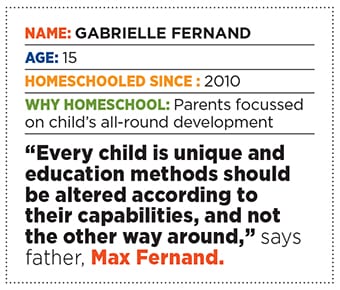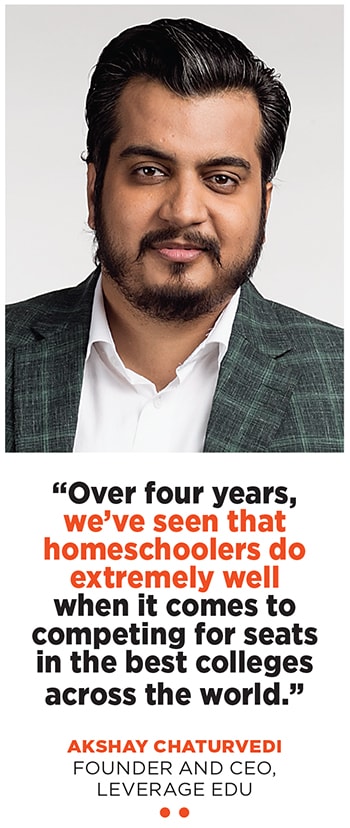Is India ready for home schooling?
Concerns over a monotonous, formal education system coupled with edtech's innovative approaches bolster the homeschooling proposition over traditional schooling. But is India ready for it?


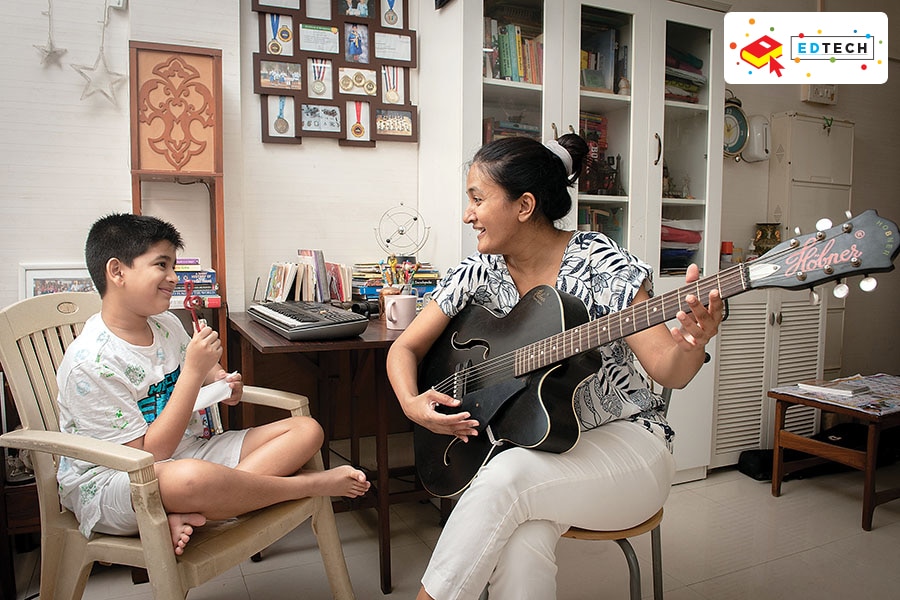 Amrutha Joshi Amdekar with her son Agastya (10) during a fun homeschooling session at their Mumbai residence
Amrutha Joshi Amdekar with her son Agastya (10) during a fun homeschooling session at their Mumbai residence
Image: Neha Mithbawkar for Forbes India[br]When Harshita Arora was introduced to computer science in Class 7 in 2015, she started exploring the subject beyond the specified CBSE syllabus. Her teachers at Pinewood School, Saharanpur, Uttar Pradesh were supportive, and introduced her to coding even when the syllabus didn’t account for it. Curious to know more, she started researching and developed a passion for programming. “The internet was a relatively new concept for me. I’d come back from school and spend all my time trying to learn more about coding. It was fascinating to see this whole world of builders who were using their programming skills to build great companies,” she says.
By the time Arora was 15, she realised that she wanted to create an application, and that school was a constraint on the time she needed. “I knew what my goal was and that schooling wouldn’t help me achieve that. I started looking for alternatives online and was introduced to the concept of homeschooling,” she says. She started reaching out to parents who were homeschooling their children to know more about the possibilities.
Her parents, however, didn’t see it as a viable option. “They wanted me to complete school, go to college, and get a job like everyone else. They worried that if my plans for developing an application failed, it would be difficult to get admitted to colleges in India as homeschooling doesn’t have any legal status,” she explains. With Elon Musk as her role model, Arora was confident that the formal education system will only be a roadblock. After multiple discussions and introducing her parents to some successfully homeschooled children, they agreed.
With the internet as her teacher, Arora started homeschooling in 2016. A year later, she started developing a cryptocurrency tracker application to track prices of 1,000-plus cryptocurrencies from over 19 exchanges, and in January 2018 launched Crypto Price Tracker. “After a series of unexpected successes with the app, Redwood City Ventures acquired it in March 2018. That opened up an array of opportunities for me. I came to San Francisco and have since co-founded AtoB—a technology startup in the Bay Area.”
Arora is one of the select few children who achieved success by choosing a rather unconventional alternative to schooling. There are more like her. In 2010 and 2016, Sahal Kaushik and Malvika Joshi, two homeschooled children, came into the limelight when they were admitted to the Indian Institute of Technology (IIT) and Massachusetts Institute of Technology (MIT), respectively.
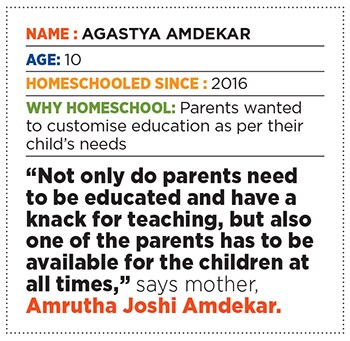
Supriya Joshi, Malvika’s mother, who started homeschooling her two daughters in 2003, is one of the pioneers of advocating homeschooling in India. She says initially her approach towards education was looked down upon it was only after the academic success of her older daughter that people around her became curious about homeschooling, “It’s surprising to see how the success of homeschooling is more important to parents than understanding what it stands for,” says Joshi.
Homeschooling, an alternative approach to education, is a way of learning outside the defined parameters of school education and puts the parents/guardians in charge of their child’s all-round development. What and how to teach is determined by the parents who might not follow the curriculum of any education board. Parents either choose not to enrol their children in schools or—as is most prevalent in India—when a school’s approach doesn’t align with a child’s needs, they pull their children out of school.
Reliable research on homeschooling, its rising prevalence or outcomes is sparse. While there are no estimates of the number of homeschooled children in India, the cities of Mumbai, Pune, Bengaluru and Hyderabad seem to have most of the homeschooling communities.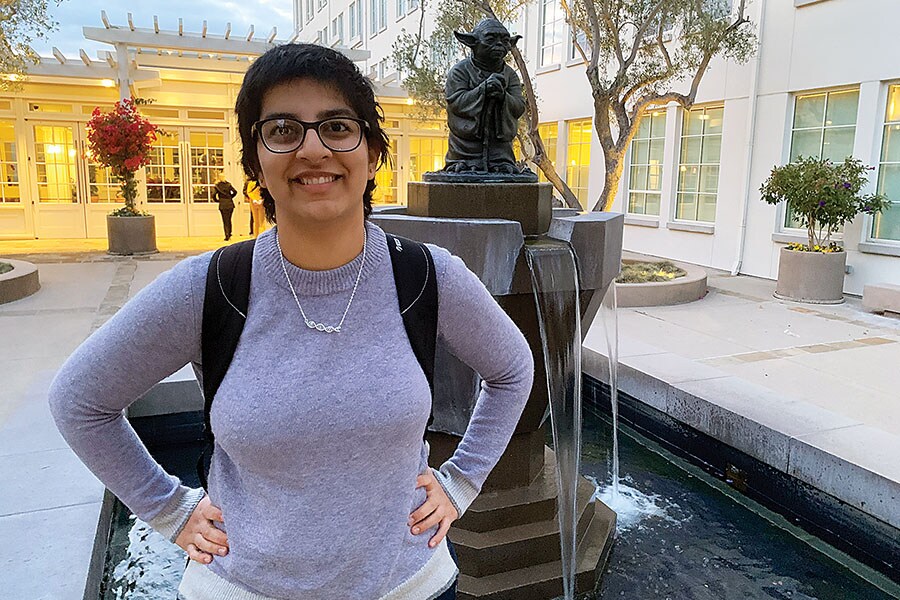 Harshita Arora’s homeschooling helped her focus on coding, leading her to San Francisco where she co-founded a startup[br]Why Homeschool?
Harshita Arora’s homeschooling helped her focus on coding, leading her to San Francisco where she co-founded a startup[br]Why Homeschool?
In India, the concept initially catered to specially-abled children who needed more parental support. But with the rise of concerns over a stringent education system, parents like Joshi started experimenting with the approach. Other reasons include concerns about bullying, child abuse, inefficient teaching practices and children wanting to build careers outside of academics.
Max Fernand is another homeschooling parent in Mumbai who says schools do not acknowledge individual brilliance. “A typical classroom is filled with 60 students. One teacher cannot do justice to a room full of unique children,” he says. Having homeschooled both his children, Fernand highlights its perks. “My daughter reads history and science as per CBSE, mathematics as per US curriculum and English from another curriculum. So one can merge the best aspects of various curricula to suit a child’s aptitude.”
The Covid-19 pandemic has made parents more curious about homeschooling. “I get calls from a number of parents exploring homeschooling,” says Amrutha Joshi Amdekar, who has been homeschooling her 10-year-old son for the last four years. “I know a couple of parents who started homeschooling as a response to the increase in the time they could make for children. They started educating them by introducing several unexplored aspects of learning, which they were proud to post on social media,” she says, adding that as life goes back to normal, these parents might enrol their children in schools again.
Amdekar emphasises that homeschooling is a demanding “job” that needs an adult’s complete attention. “Not only do parents need to be educated and have a knack for teaching in a way that their kids understand, but also because one of the parents has to be available for the children at all times,” she says.Homeschooling has also got a boost because of edtech companies that cater to the curricula of various education boards. While most parents refer to these online platforms to understand different concepts, they try not to restrict their children to the curricula. “Khan Academy, Unacademy, Byju’s and the likes do offer innovative digital learning methods that are great to understand concepts… but we do not just follow their syllabus. When my son wants to understand a subject listed for Class 8, he gets to do that now. If he was in school, he couldn’t have been able to make time for that,” says Amdekar.
Akshay Chaturvedi, founder and CEO, Leverage Edu, an artificial intelligence (AI)-enabled marketplace that helps students with higher education and career guidance, believes homeschooled children have a higher chance of excelling. “Over four years of operations, we’ve seen that homeschoolers do extremely well when it comes to competing for seats in the best colleges across the world. This is also because the homeschooled kids are raised on the principle of curiosity and creativity as opposed to a stringent, monotonous exam system, which mirrors the requirements of higher education across the world,” he says.
Is Homeschooling Legal In India?
The approach to alternative education varies globally. Homeschooling is legally recognised in Australia, Canada, New Zealand, the UK, Mexico, Chile and the US. Some have chosen to regulate home-education strictly. It’s outlawed in Germany, while last year French President Emmanuel Macron proposed tougher regulations on home education to combat religious extremism. Parents in the UK are required to ensure their children receive full-time education “suitable” to their ages, although what that should involve is undefined.
In India, homeschooling is still not recognised there is no policy defending or opposing it. The Right of Children to Free and Compulsory Education (RTE) Act, 2009, stipulates eight years of formal education for all children, but doesn’t mention any alternative approach.
In 2009, a public interest litigation (PIL) filed before the Delhi High Court by Shreya Sahai (14) contended that Section 18 of the RTE Act does not recognise any other mode of education except through formal schooling. In April 2010, the PIL that sought amendment to the RTE Act was dismissed by a HC division bench, which asked the petitioners to make a representation to the Ministry of Human Resource Development (MHRD), asking for its vision on homeschooling. Consequently, the MHRD filed an affidavit stating that there is nothing illegal about homeschooling and that the RTE Act doesn’t come in its way. However, the lack of a policy still raises concerns about whether homeschooling is equivalent to formal schooling.
For homeschooled children to be eligible for higher education in India, proof of competence needs to be produced. This can be done by appearing for the National Institute of Open Schooling (NIOS) examinations that offer Open Basic Education for children up to 14 years of age. Children can take up exams at A, B and C levels, which are equivalent to Classes 3, 5, and 7, or they can opt for Secondary Education Course and Senior Secondary Course, equivalent to Class 10 and 12 exams respectively. They can also opt for the International General Certificate of Secondary Education (IGCSE), which is a part of the Cambridge Assessment International Examination (CAIE). After clearing any one of these exams, children are eligible for college admission.
However, homeschooled children still face problems during college admissions in India. “Colleges need a school-leaving certificate and a migration certificate, assuming that every homeschooled child would have been enrolled for primary schooling at least, which wasn’t the case with our son he was homeschooled since the beginning,” says Fernand. His son had taken the NIOS exams, which are equivalent to CBSE’s Class 10 and 12 exams. Fernand and his wife then questioned the college’s policy. “We told them that denying a child a seat despite him clearing the NIOS exam would mean they claim that NIOS doesn’t have as much value as other boards. They eventually changed their policy,” he says. In response to the increase in homeschoolers, in 2019 the Maharashtra government launched an Open Educational Board to facilitate homeschooling.
There are very few Indian websites that provide information, study material or guidance about homeschooling. Swashikshan—Indian Association of Homeschoolers—is one such website that was created by a group of homeschooling parents in Mumbai in 2012. “When we started, there was almost no help available for parents. A few of us decided to create a bank of resources, providing literature, answering FAQs, and organising sessions for parents,” says Supriya Joshi, founding member of the website. As long as she was a homeschooling parent, she contributed to the website. “Now both my daughters are grown-ups, so I’ve stepped back. The website is now run by volunteers and parents currently homeschooling.” The website, however, isn’t as active as in the initial years questions uploaded on it in the last two years remain unanswered.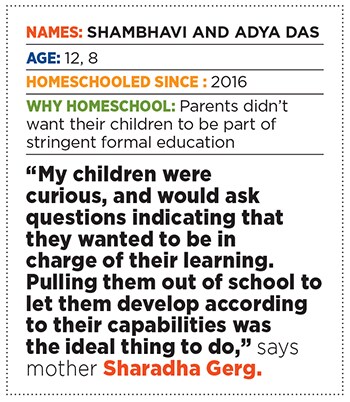 What Does the NEP Say?
What Does the NEP Say?
When the New Education Policy (NEP), 2020, was introduced, homeschooling parents were hopeful of getting a few answers. However, the document only mentions it in the context of the Right of Persons with Disabilities (PWD) Act 2016.
While the final document didn’t have a targeted approach to the future of homeschooling, the drafting committee had proposed a few actions to be taken to facilitate it. “Over two and a half years of discussions, homeschooling was brought up many times. The committee had come up with three to four possible actions that could be taken, and we also proposed that it should be recognised under RTE Act, 2009. Though every aspect didn’t make it to the final vision document, the crux of it was reflected in the policy, even though indirectly,” says MK Shridhar, member, Central Advisory Board of Education, and member secretary of Karnataka Innovation Council and Karnataka Knowledge Commission.
TV Kattimani, vice chancellor, Indira Gandhi National Tribal University, Amarkantak, Madhya Pradesh, another draft NEP committee member, agrees: “Homeschooling was widely discussed, and members agreed that it is a very progressive approach to education.”
The committee also considered making homeschooled children eligible for CBSE, ICSE and state board exams, which are out of bounds under the current regulations. “When this point was raised, a member pointed out that homeschoolers are already eligible for the NIOS and IGCSE exams. But other members agreed that homeschoolers should be allowed to sit for all kind of exams,” says Kattimani. The proposition did not make it to the final document.
Double-edged Sword
Homeschooling is opposed by many. “Why do we need a deviation from formal education?” asks Ashok Agarwal, lawyer and president of All India Parents Association. “Schools provide a unified platform where well-educated teachers, tried-and-tested teaching approaches and thoughtfully formulated syllabi aim at developing a child’s perspective in an age-appropriate manner. Nobody should be allowed to play with the lives of children, not even the parents.”
Agarwal argues that the government should not take a stance on homeschooling. “Once you start acknowledging homeschooling as a mainstream alternative, the sufferers would be the poor children, whose parents might end up pulling them out of schools to reduce their expenditure and not teach them because of lack of resources or knowledge or time. No one will be able to account for how those parents are homeschooling. It will only further alleviate the education divide in the country,” he says.
A rise in the number of homeschoolers—as a response to the pandemic and increasing awareness—revives old worries. A child’s social development is one of them. Another fear is that a wider acceptance of homeschooling will undermine the efforts undertaken to improve schools.
The strongest argument, though, relates to abuse. Children could face emotional or physical abuse at home a lack of interaction with the outside world may hinder their ability to express concerns, or an outsider’s ability to spot abuse or neglect.
Regulators in the UK worry that parents can use home education as a cover to send their children to unlicensed schools with a fiercely religious curriculum. In 2011, the death of Dylan Seabridge (8) from scurvy caused outrage in Britain. His parents had never enrolled him in a school. A 2018 study of six school districts in Connecticut, US, showed that more than a third of families who had withdrawn their children from schools in the previous three years had been the subject of at least one report of child-neglect or abuse.
Despite these concerns, parents who are homeschooling their children are convinced that as India begins to appreciate individuality, there will be a further surge in homeschooling. “The aim of education should be imparting knowledge benefiting a child’s all-round development. Every child is unique, and education methods should be altered according to their capabilities, and not the other way around,” says Fernand.
First Published: Apr 22, 2021, 12:41
Subscribe Now